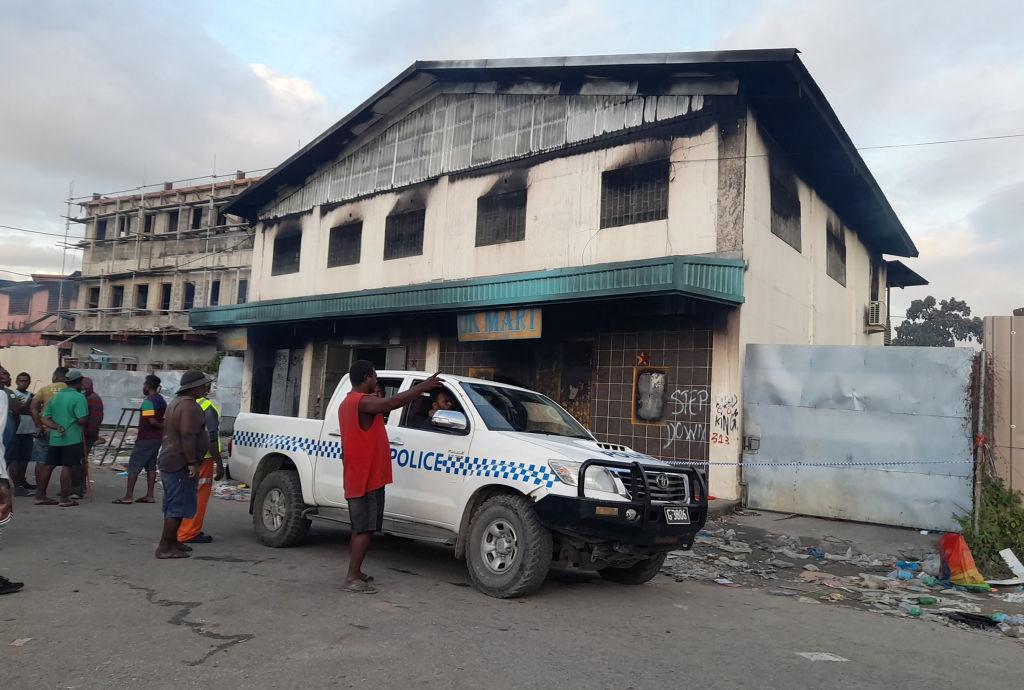
On 14 July, after months of controversy, Solomon Islands Prime Minister Manasseh Sogavare publicly ruled out the possibility that his security pact with Beijing would result in a Chinese military base in his country. Many Indo-Pacific nations no doubt welcomed his assurance that ‘there is no military base, nor any other military facility or institutions, in the agreement’.
In Canberra, many will have welcomed Sogavare’s declaration that Australia remains the ‘security partner of choice’ for Solomon Islands. However, his comments that his government would only call upon China if there were a gap Australia couldn’t meet is telling. His warm greeting of Australian Prime Minister Anthony Albanese was equally telling.
Like most politicians, Sogavare aspires to prevail over his opponents and stay in power. However, he faces mounting domestic challenges, including declining public trust in his government.
Domestic law-and-order problems present a genuine risk to Sogavare’s leadership. In November, he refused to meet with protesters from the province of Malaita, which led to serious riots that caused widespread damage in Honiara. A month later, he faced a vote of no confidence, which he easily defeated. Sogavare quickly linked the riots with Taiwanese influence (in 2019, he decided to switch recognition from Taiwan to China, which Malaita has opposed ever since).
But Sogavare, unlike leaders of the ilk of Cambodian Prime Minister Hun Sen, doesn’t harbour aspirations to leave a leadership legacy or dynasty. Instead, his motivations are far more modest. He wants to maintain his power and control over the island nation. His strategy to achieve that has both external and internal dimensions.
Externally, he seems set to ensure that money and aid from the East and West continue to flow to Solomon Islands. In doing so, he will continue to exploit opportunities as they arise. For now, Chinese money is flowing. And he has Canberra worried that if it doesn’t provide the security he needs, China will be waiting in the wings.
Internally, Sogavare is moving to cement his control over his opposition. Like with Cambodia’s Hun Sen, these manoeuvres include controlling the domestic media. Last month, Sogavare transferred control of the state-owned broadcaster SIBC’s budget directly to the government. SIBC has now been ordered to only publish favourable news about the Solomons government.
On Monday the ABC reported that Sogavare, like Hun Sen, has been able to access Chinese funding to support his grip on power. The ABC obtained access to documents that indicate a ‘Chinese slush fund was activated twice last year and dispersed nearly $3 million directly to members of parliament loyal to the Prime Minister’.
Sogavare has shown consistent disdain for international media, including the ABC, refusing to engage with them.
Experience in Bougainville and Solomon Islands has shown that in the absence of independent media, local communities will be informed by rumours.
It’s no accident that Sogavare has accepted the offer of police training from China. He also made a statement regarding a more permanent Chinese police training presence. In contrast with Australia’s approach to policing, the priority for China’s police is protecting the Chinese Communist Party. A loyal praetorian guard is a necessary tool for a leader facing increasing opposition while focused on prevailing.
Sogavare would do well to remember that Solomon Islanders have a deep cultural memory of colonial-era policing. Recent history has also shown that aggressive policing fails to quell riots. In some cases, aggressive policing in Solomon Islands has promoted further civil unrest. While this doesn’t bode well, Sogavare isn’t keen for Solomon Islands to become a vassal state of China. That would prevent him from playing every side to get the best deal.
While money does talk in the Pacific, strong relationships are built over time. Australia is fortunate that its police have worked closely with their Solomon Islands counterparts for decades. From commissioner to recruit, Solomon Islands police know that Australian police are their partners. Of course, China’s policing aid, including the gifting of equipment and training, will continue. China will also, in time, likely provide Solomon Islands with a police academy.
Australia’s long-term law enforcement cooperation with Solomon Islands, including its 14-year-long regional assistance mission from 2003 to 2017, has profoundly impacted the nation’s police. The police force has moved from being concerned with policing the people and protecting the state to serving the community, but this positive shift could be easily undone through Sogavare’s pact with China.
Neither Australia nor any other country should try to outspend China in Solomon Islands. But we should be looking for opportunities to deepen our relationships. Solomon Islanders, and their police, want community policing, not security policing. Australia should seek opportunities to increase cooperation and capacity-development activities through the Australian Federal Police and the Australian Border Force. Both agencies should look for opportunities for Solomon Islands police to attend specialist and leadership courses with their Australian counterparts. Australia should look for opportunities to continue assisting with the development of Solomon Islands police training programs. Where appropriate, Australia should provide the kinds of capabilities that help with community policing.
Regardless, China, like Australia, must deal with Sogavare’s opportunistic nature. China has a security pact with Solomon Islands, but the conditions on the ground can and will change regularly. Australia, with its long-term relationships and principles-based approach, is in a far better position to navigate the ebb and flow of this challenge than China.